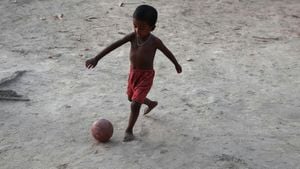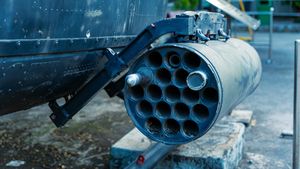Exploring the cosmos has long captured the imagination of humanity, but as ambitious missions to Mars and prolonged stays on the Moon ramp up, concerns about the health of astronauts are coming to the fore. Recent reports highlight some serious risks associated with deep space travel, particularly linked to the burgeoning field of quantum biology, which investigates how the laws of quantum mechanics affect living organisms.
A report from The Guy Foundation raises alarms about potential health hazards astronauts might face on extended missions. Research indicates astronauts may encounter accelerated aging, increased insulin resistance, and even reproductive issues as they venture farther from Earth. These conditions could worsen over time and may not be easily reversible, leading to unsettling questions about the feasibility of human exploration beyond our planet.
Professor Geoffrey Guy, Chairman of The Guy Foundation, emphasized, “Up to now, the space community’s focus has been on the physical and engineering challenges inherent in space travel.” He went on to explain, “Just surviving in space is not the same as living in optimal health and thriving.” It's clear the challenges are both physical and deeply biological.
One of the findings the report spotlights is the role of mitochondria, the energy centers of our cells. These tiny powerhouses are particularly susceptible to the harsh conditions of space, such as increased radiation and microgravity. The report suggests these factors may cause mitochondrial dysfunction through heightened oxidative stress, leading to what's termed the “accelerated aging phenotype” (AAP) among astronauts.
Researchers have long known about the physical dangers of space travel but have only recently begun to grapple with the biological ramifications. The data indicate strong links between the extreme conditions of space and accelerated biological aging. Factors like radiation and microgravity significantly disrupt the cellular stability of astronauts, potentially leading to cognitive impairments and compromised immune systems.
The report outlines how principles of quantum mechanics can shed light on cellular processes under the unique circumstances of space travel. Quantum phenomena, such as tunneling and coherence, might influence how electrons transfer within mitochondria. Should these quantum processes be disrupted, they could trigger instability and stress at the cellular level.
Looking to the future, scientists believe addressing these challenges with quantum biology could yield promising strategies for both space health and terrestrial medicine. The overlap between space-related health challenges and aging diseases on Earth presents exciting avenues for research. The report mentions degenerative conditions like Parkinson’s and Alzheimer’s, which exhibit symptoms analogous to those observed among astronauts.
Given the potential for cross-pollination between space health and age-related disease treatments, there lies much promise. If scientists can pinpoint how to stabilize quantum processes within cellular structures, they may devise protective measures ensuring astronaut well-being on lengthy missions and offer therapeutic avenues for aging-related maladies.
Meanwhile, the report also urges dedicated experiments to assess how space conditions affect cellular structures more comprehensively. For example, the influence of microgravity on cellular health, how low magnetic fields impact mitochondrial function, and the viability of simulated Earth day-night cycles to improve health outcomes.
The need for advanced research partnerships is clear, particularly collaborations between space agencies like NASA and private entities such as SpaceX, paired with quantum biology experts. An interdisciplinary approach may be key to unraveling these hidden mechanisms affecting astronaut health.
Despite all this, the challenges of sustaining human health during space travel extend beyond molecular biology; they tie closely to nutritional needs as well. Astoundingly, astronauts on long-duration missions, particularly to Mars, will have to manage their diet without possible resupplies, introducing multifaceted risks intertwined with quantum mechanics.
A recent paper titled “Human Adaptation to Spaceflight: The Role of Food and Nutrition—2nd Edition” emphasizes the importance of nutrition for astronauts during missions. With missions to Mars potentially lasting years, ensuring astronauts receive proper nutrition becomes as pivotal as the spacecraft’s engineering.
Research highlights how low gravity can lead to muscle and bone density loss, coupled with the heightened radiation exposure raising cancer risks for astronauts. The study notes, “The importance of nutrition...has been documented repeatedly throughout history,” drawing parallels between perilous journeys of the past and present space endeavors.
Interestingly, research from the Antarctic provides insights applicable to space conditions similarly affecting astronauts. Both environments lead to isolation, limited sunlight, and various health risks rooted primarily within metabolic systems.
Yet as these researchers note, astronauts won’t have access to fresh supplies along their way to Mars. The very essence of sustenance must be rethought for interplanetary travelers. Currently, astronauts receive their food mainly through Crew Specific Menu (CSM) systems, but the desire for fresh produce persists.
Efforts to grow food aboard the International Space Station have produced mixed results. While some crops like lettuce and kale have seen success, scaling this capability to meet full nutritional needs on longer missions introduces many hurdles, especially concerning space and resources.
Another worry lies within the idea of nutritional supplementation, which researchers have pointedly debunked, stating whole foods provide benefits incapable of being replicated by supplements. The deduced risks highlight how reliance on artificial products could be counterproductive. This sentiment echoes the report’s urgency; without proper nourishment, astronauts could face severe health setbacks, hindering mission success.
Embarking on trips to Mars raises myriad nutritional and quantum health-related questions. Less physically fit individuals taking prolonged trips harbor unknown risks, as research on older astronauts or those with non-ideal health profiles remains minimal.
So the question remains: Will science catch up to the aspirations of space travel? With growing knowledge about quantum biology and the persistent challenges posed by spaceflight, experts believe the endeavor to understand and mitigate health risks is achievable, provided researchers receive the necessary support and collaboration across various fields.
The incorporation of quantum biology may one day transform our approach not only to space travel but also to the myriad health challenges we face back on Earth. This quest could lead to groundbreaking insights with far-reaching benefits—ultimately helping us thrive both among the stars and on our own planet.



